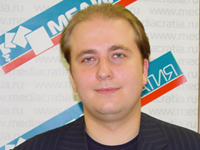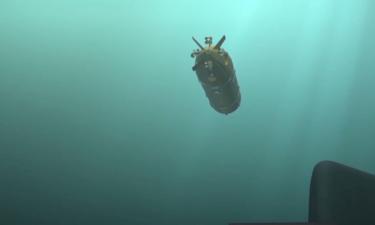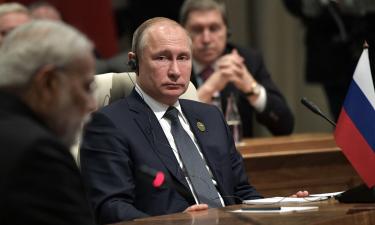Russian military-industrial complex company pays 200 percent dividend to shareholders
On Tuesday, June 26, a rather uncommon decision was made by the shareholders of the OJSC Omsk Production Association “Radio Manufacturing Plant Named After A.S. Popov” at their annual general meeting. It was declared that a dividend of 200 percent would be paid to the shareholders of the company. We took the news as a good opportunity for interviewing Ivan Polyakov, General Director of the Omsk Popov Radio Plant.

Q: Mr. Polyakov, how things are at your company today? For more than five years now, ever since you took over the plant, you have counted on a government order. Did the tactics pay off?
A: The tactics were a success because they helped to tackle the main problem: the workers and shareholders of the company became confident that the prospects for core activities were sustainable. A change in the government policy with regard to companies of the military-industrial complex has played a huge role. There has been an upcoming budgeting of the sector for many years now. The budgeting enables defense industry enterprises to maintain the output at a certain level. Besides, it also provides for a mid-term development program of Russia’s defense industry. The government order has accounted for 90 percent of the company’s gross output in the last five years. In the meantime, the output of our company has increased by 7 times.
The company’s product range and the number of federal ministries placing orders with the Omsk Popov Radio Plant have enlarged too. At this point I would like to emphasize that the price of products used to be a decisive factor for many customers. It is an open secret that major Western companies often practice dumping in the Russian market. These days the main criterion has changed when it comes to tendering. I am talking about the uniqueness of technologies which can guarantee national security in the broadest sense of the word. According to a prospective mid-term development plan of our company for the period though 2015, an absolute output rate for production of special communications systems for defense and law enforcement agencies should continue to grow while the volume of products for civil use is expected to increase by approximately 60-70 percent. Consequently, the segment should account for 40% in terms of gross output.
Q: What does your plant have to offer in a market environment?
A: We do not manufacture frying pans. We are not going to compete against Japanese or Korean producers of TV and telephone equipment either. First, there are no prospects for us to succeed in this field. Second, we had better bear in mind that competing for goods is not a priority for the Omsk Popov Radio Plant. Basically, our company lays emphasis on competition for infrastructure capabilities. Producing unique communications systems for our customers is only part of our main goal. We also aim to develop and manufacture a truly advanced piece of equipment capable of offering our costumers new additional opportunities in terms of data exchange. At the same time, our products used in the telecommunications infrastructure are guaranteed to operate effectively despite any sort of natural or man-made calamities including earthquakes, energy crises and nuclear warfare. These decisions are not market-oriented, by and large. However, they form the foundation for making our products competitive in the domestic and foreign markets.
Q: When and why do you think the recovery of the plant began?
A: Taking into account the financial indicators, the year 2002 is officially considered a turning point for our company. Production decline drew to a close at that year.
However, I should say that the recovery began to take shape a bit earlier. There are a number of external and internal reasons behind the process. The external or objective reasons largely stem from certain steps which the Russian government started to take in order to deal more closely and confidently with issues relating to national security, economic national security inclusive. The subjective reasons have to do with a tough economic policy pursued by the company shareholders. The shareholders made a clear decision to keep the core business running. Looking back at the decision taken 7 years ago, I can tell you that it proved to be 100 percent correct. We managed to preserve our technologies, our science park and production capacities. Our company could have gone up like a rocket only to come down like the stick if we had tried to focus on the manufacture of consumer goods back then.
Q: In an interview published two years ago, you said that your company could play a more active role in the Asian and African market. Did those plans turn into a reality?
A: Yes, they did. We have made some achievements we can be proud of. At the same time, I’m fully confident that we can and should increase the presence of Russian technologies in the world market. You have got to take into account a specific nature of both our company and the sector as a whole: we are not an independent entity of a special economic community. As regards foreign trade and cooperation, the state plays a key role. Nowadays I am really glad that the state has virtually completed restoring the distribution infrastructure for standards and interests of Russian companies operating in the given markets – those are the markets our companies had to leave in the 1990s. Now the time is drawing near for carrying out joint high-technology projects within the framework of international economic cooperation. In particular, the Omsk Popov Radio Plant made an impressive display of technical capabilities of its products at Combined Endeavor 2007, the international military exercises held in Germany. The exercises involved signal troops from 27 countries. The exercises demonstrated that our products had at least two qualities essential for the world market: uniqueness and compatibility.
Q: Are any production modernization programs under way at your plant? If so, what kind of funds do you use for these purposes? What is your opinion about the role of Russian banks in modernization of production facilities?
A: Modernization of production is not an aim; it is a necessity of our time. Modernization and renovation programs are being implemented continuously at our company. For instance, we recently purchased rights for the use of a unique management computer program developed by SiBOSS, one of the largest software manufactures in Russia. We considered possibilities based on our own methods or partnership projects. We just cannot take any chances that may put the working system in jeopardy or make it vulnerable. Our specialists rank the risks of cooperation with such foreign companies as Microsoft or Oracle as quite high because the foreign companies cannot ensure that our specialists are in total control over the functioning of the whole system. As a result, our specialists cannot forestall potential failures. It is true that the foreign companies offer a guaranteed compensation for damage caused by a system failure. Not unlike RAO UES and Gazprom, we believe that infrastructure failures are simply incomparable with damage done to our production activities. It givesme great pleasure to state that the Russian high-tech corporation outperforms its renowned foreign competitors in many aspects.
Today we use our own funds for running our modernization programs. Unfortunately, the Russian banking infrastructure equals that in Russia’s industrial sector despite a seemingly large variety of banks and their services. Hopefully, a development bank that is being set up by the government will help create an adequate credit facility for further development of high-tech industry in this country.
Q: Could you please comment on the latest appointment of Pavel Grachev, Russia’s former defense minister? What are the duties he is going to perform in your company?
A: On June 1, 2007, Pavel Grachev was appointed to the position of Chief Adviser, the leader of a group of advisers to the General Director of the Omsk Popov Radio Plant. Any defense corporation in the world would be honored to have such an official on board. The appointment of high-ranking government officials to large companies is a common practice all over the world. In my opinion, this appointment indicates that Russia’s management system of industrial corporations complies with the world standards. A chief adviser will be involved in work related to the implementation of a complex task. In other words, he will promote the interests of our company.
Q: What is your opinion with regard to the government policy in the industrial sector? What else should be done to make it more effective?
A: I can see a rather positive trend taking shape these days. The government has opted to switch from the short-term forecasts to mid-term programs. In particular, the government suggested that standard 1-year budgeting be changed to cover a 3-year period. That is the way for the government to offer additional guarantees to domestic producers. The government has also started to appreciate the need for stepping up efforts to promote Russian national brands in the world market. More importantly, now we have is a clearer picture when it comes to ways and methods which should be applied to transformation of the structure of Russian economy based on the development of innovations.
Speaking of other things that should be done to make the industrial policy more effective, I would mention a certain lack of understanding that still remains with regard to the significance and importance some non-economic factors can play in the life of the people and production development, no matter how paradoxical this statement may appear. If we want Russia to become a prosperous industrially developed nation, not only the businessmen should be mobilized for the fulfillment of this job. Film makers, writers, artists and playwrights should partake in the process too.
Reference information
The Omsk Production Association “Radio Manufacturing Plant Named after A. S. Popov” was established in 1948 pursuant to a decree by the USSR Council of Ministers. Product lines were brought into operation in 1954. The enterprise was converted into a joint-stock company in 1992. The number of shareholders is 7339. The annual general meeting of the company shareholders decided to pay a dividend of 200 percent on ordinary and preference shares for 2006.
The Omsk Popov Radio Plant is a developer and producer of advanced communications systems, including mobile systems, for military and civil use. The product range exceeds 150 items.
Ivan Polyakov has been a general director of the company since 2002.
https://www.relero.ru
Subscribe to Pravda.Ru Telegram channel, Facebook, RSS!




